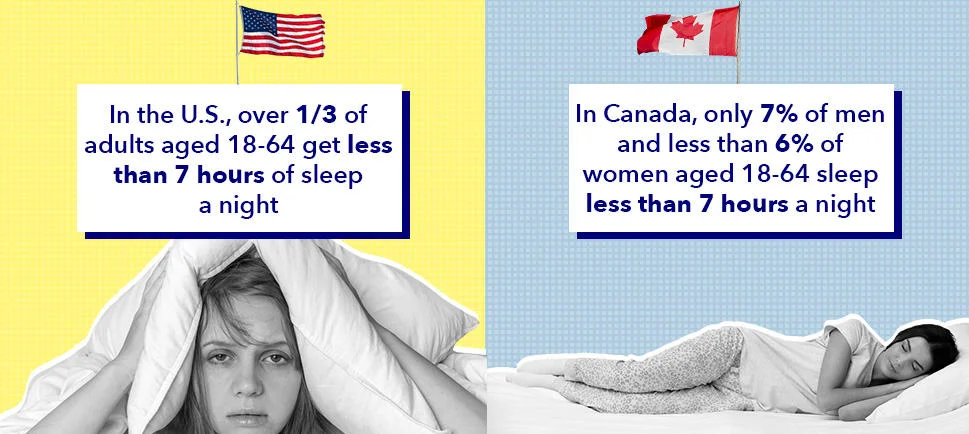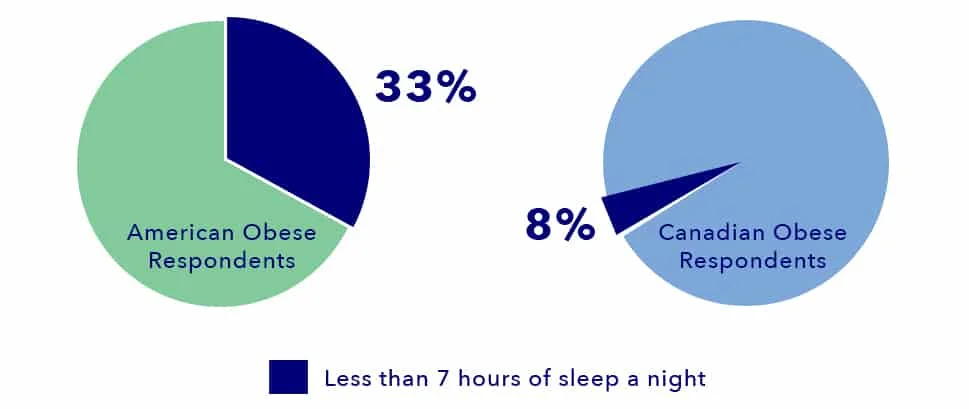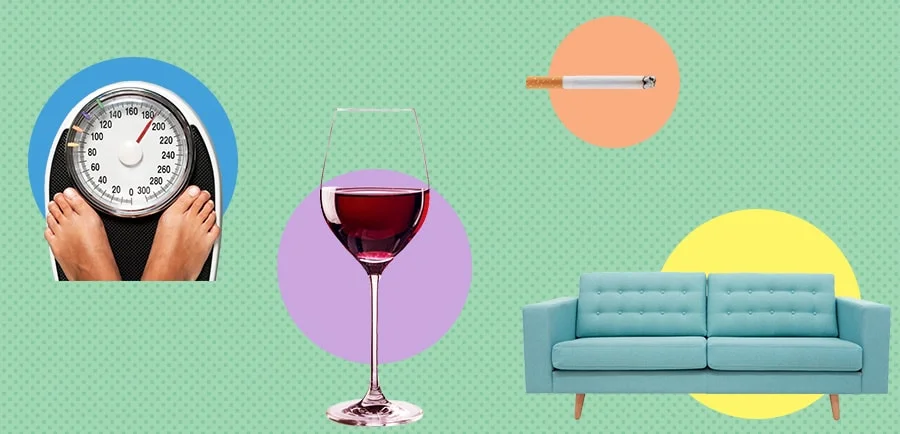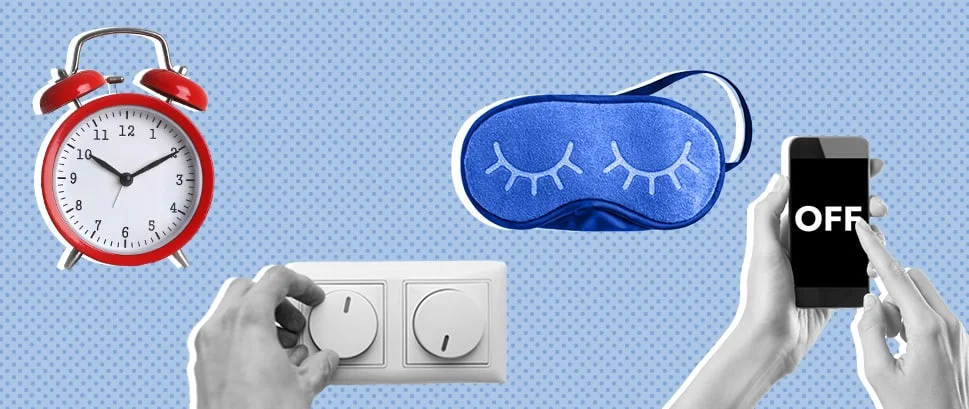When it comes to sleep, few countries can say their residents get enough of it. Insomnia, sleep deprivation, and sleep disorders are common the world over and becoming more prevalent. Even in countries famous for their siesta-friendly lifestyle, sleep is taking a backseat to modern stresses and busy work schedules.
But there are some countries that sleep better than others, and that made us wonder: how do two large neighboring countries like the United States and Canada compare when it comes to slumber? The population of the US is ten times that of Canada — 327 million versus 37.5 million — but does that make a difference? Who sleeps better, North or South?
Sleep Health: US vs. Canada

The US and Canada have a lot in common, from official language to certain cultural touchstones like a democratic government and a passion for sports. We’re also two of the largest countries in the world. We even share Niagara Falls, which sits on our joint border.
Where sleep is concerned, though, the US and Canada fly different flags. The recommended nightly amounts of sleep are the same in both countries — seven to nine hours for adults and ten hours for adolescents. But no matter what their age, medical condition, or gender, Americans and Canadians have different sleep habits across the board. Before we dive into the numbers, a few notable takeaways:
- When we look at the overall duration of sleep, Canadians are way out ahead. Over a third of American adults sleep less than seven hours a night, but the number is in the single digits for Canadians
- Non-white adults in both countries get significantly less sleep than white adults
- Huge numbers of American high school students go without adequate sleep. The data looks better on the Canadian side , but is contradicted by other studies and anecdotal evidence that show similar stats on both sides of the border
- One finding that surprised us: less sleep is strongly associated with chronic health conditions in the US, but not so much in Canada
Our research showed that, despite the similarities between the two countries, they diverge on some important health-related metrics. Let’s look closer at the details and find out how the US and Canada stack up against each other.
Overall Sleep Duration
Adults
35.5% of American men and 34.8% American women aged 18-64 report sleeping less than seven hours a night. By contrast, the numbers for Canadians are 7% for men and less than 6% for women. Americans over 64 years old sleep a little better — a quarter of respondents report sleeping less than seven hours — but at 7% for men and almost 8% for women, older Canadians still have a hefty advantage over Americans.

The numbers go up on both sides when we add in ethnicity. Almost 41% of non-white Americans report sleeping less than seven hours a night, while over 9% of non-white Canadians get insufficient sleep on a daily basis. That’s a significant difference, especially on the American side.
Why such a spread in the numbers between north and south? Well, America’s 24/7 work culture could be partly to blame. Canada mandates two weeks of paid time off for employees who have been on the job at least a year, and three weeks of time off after six years. Canadians also enjoy between six and ten paid holidays. In the US, mandated time off is available only for jury duty, maternity and paternity leave, and voting. More American workdays may translate to less sleep.
Older people in the US are retiring later, which may help explain why even Americans over 64 aren’t sleeping as well as Canadians. Americans are also accustomed to a culture that doesn’t emphasize the importance of sleep, which may carry over into their later years.
Short Sleep Duration (<7 Hours) Adults vs Older Adults
| USA | Canada | |||
|---|---|---|---|---|
| Correlates | Adults | Older Adults | Adults | Older Adults |
| Gender | ||||
| Men | 35.50% | 26.30% | 7% | 7% |
| Women | 34.80% | 26.30% | 5.60% | 7.91% |
| Ethnicity | ||||
| White | 33.40% | 33.40% | 7% | 7% |
| Non-Whites | 41.46% | 41.46% | 9.03% | 9.94% |
| * Adults (18–64 years) * Older Adults (65–79 years) | ||||
High School Students
The data is even more alarming for American high school students. Adolescents should get at least ten hours of sleep every night, but 66% of boys and 71% of girls routinely get less. By comparison, just 7% of Canadian boys and 9% of girls get less than ten hours of sleep. The numbers are similar for both white and non-white students in both countries.
What could explain the whopping disparity between American and Canadian high school students? We don’t have specific data to explain why American students appear to sleep so much less than their Canadian counterparts, but Canadians may be catching up fast. Though government statistics show that only a relatively small number of students sleep less than seven hours, other studies suggest that the number is much higher. In fact, one study states that half of Canadian high school students get less than the recommended amount of sleep, making them almost as sleep deprived as Americans.
Short Sleep Duration Among High School Students
| USA | Canada | |
|---|---|---|
| Correlates | % | % |
| Gender | ||
| Men | 66.50% | 7% |
| Women | 71.30% | 9.31% |
| Ethnicity | ||
| White | 68.30% | 7% |
| Non-Whites | 69.08% | 6.30% |
Health Risk Factors
We’ve covered average sleep duration in healthy Americans and Canadians between adolescence and old age. So, how do the countries compare when it comes to sleep, lifestyle choices, and medical conditions? Certain health-related behaviors and common illnesses are strongly associated with less sleep. Let’s examine the data to see how North and South match up when it comes to sleep and health.
Obesity
Obesity, which is defined as a body mass index of 30 or above, can cause or be caused by lack of sleep. Lack of sleep impacts metabolism and the release of hormones related to appetite, as well as the risk of diabetes. Our data shows that 33% of obese American respondents get less than seven hours of sleep each night, while 26.5% report getting enough sleep.

The numbers look very different on the Canadian side. Only 8% of obese respondents to the north report a sleep duration of under seven hours, while 11.4% report sufficient sleep. What could explain the difference? Well, obesity can also cause excessive sleepiness, which may lead some people with a high BMI to sleep more than they might at a lower weight. Cultural differences could also be at play. Obese Canadians may have fewer work stressors, better access to health care, and more vacation time, allowing them to sleep more despite a higher BMI.
Smoking
The data is similar when it comes to smoking. Almost 23% of American smokers report sleeping less than seven hours a night, while 15% say they get sufficient sleep. By contrast, less than 10% of Canadian smokers report short sleep, whereas almost 15% report sleeping sufficiently. Smoking can have stimulant effects that disrupt sleep, but is also associated with poorer health. Poorer health can be linked to both short and excessive sleep, which may account for such a wide variation in the numbers.
Research also shows that children exposed to second-hand smoke sleep less than children raised in smoke-free homes. This could be a result of nicotine stimulation, certain socioeconomic factors, or both. Parents who smoke are less likely to have a stable income, which may be a factor in how well their children sleep.
Physical Activity
Studies reveal that people who exercise regularly tend to sleep better, particularly if they exercise in the morning or afternoon. Physical activity can reduce stress and decrease arousal of the central nervous system, making it easier to fall and stay asleep. The value of exercise is supported by our data, which shows that sedentary Americans are less likely to report getting sufficient sleep. Only 21% of sedentary Americans report getting seven hours of sleep or more each night.
The numbers are reversed for Canadians, with 8.6% of sedentary respondents reporting short sleep and 10.5% reporting sufficient sleep. Lack of exercise can cause sluggishness and disrupt the circadian rhythm, which may help explain why some sedentary Canadians spend more time sleeping.
Health Risk Factors by Sleep Duration
| USA | Canada | |||
|---|---|---|---|---|
| Health risk factor | Short sleep | Sufficient sleep | Short sleep | Sufficient sleep |
| Obese Body Mass Index ≥30 kg/m2 | 33% | 26.50% | 8% | 11.41% |
| Physically inactive No leisure time physical activity in past 30 days | 27.20% | 20.90% | 8.61% | 10.57% |
| Current smoker Currently smoke cigarettes every day or some days | 22.90% | 14.90% | 9.59% | 14.84% |
| Alcohol Underage drinker, binge drinker, or heavy drinker | 19.40% | 19.10% | 5.81% | 5.04% |
| * Short sleep (<7 hours) * Sufficient sleep (≥7 hours) | ||||
Chronic Medical Conditions
Long-term sleep deprivation is a known risk factor for a number of serious physical and mental illnesses. Decades of research suggests a link between lack of sleep and such common conditions as dementia, diabetes, and coronary artery disease.
Americans with heart disease are more likely to report short sleep by a slight margin. But this margin jumps when we look at other chronic conditions, such as asthma, chronic obstructive pulmonary disease, arthritis, and diabetes. Significantly fewer sufferers of these conditions report sufficient sleep.
Arthritis and asthma sufferers report some of the largest differences in short versus sufficient sleep. Almost 29% of Americans with arthritis report getting less than seven hours of sleep each night compared to 20.5% who say they get enough sleep. Depression sufferers show the biggest difference, with almost 23% saying they get short sleep versus 14.6% who report sufficient sleep. These numbers are backed up by recent scientific research that shows a strong association between clinical depression and insomnia.
How does the data on sleep and medical conditions look on the Canadian side? The results are less clear almost across the board. An equal number of people with coronary artery disease — 9.6% — report short sleep and sufficient sleep. The numbers are nearly identical for Canadian stroke sufferers, as well. In Canada, significantly more cancer, chronic obstructive pulmonary disease, and arthritis sufferers report sufficient sleep than short sleep.
We’d expect that Canadians and Americans would show similar numbers when it comes to sleep and common medical conditions. So, what might account for the data we find here? More research will help us understand the exact source of the discrepancy, but we may be seeing variations in how respondents were studied or surveyed. And again, differences in the delivery of health care, mandated sick and vacation time, and fewer work stresses may make living with chronic medical conditions easier in Canada and more difficult in the US.
Chronic Health Conditions by Sleep Duration
| USA | Canada | |||
|---|---|---|---|---|
| Chronic condition | Short sleep | Sufficient sleep | Short sleep | Sufficient sleep |
| Heart attack | 4.80% | 3.40% | – | – |
| Coronary heart disease | 4.70% | 3.40% | 9.66% | 9.66% |
| Stroke | 3.60% | 2.40% | 10.36% | 10.36% |
| Asthma | 16.50 | 11.80% | 7.35% | 15.26% |
| COPD | 8.60% | 4.70% | 9.03% | 17.57% |
| Cancer | 10.20% | 9.80% | 4.90% | 23.66% |
| Arthritis | 28.80% | 20.50% | 11.83% | 8.75% |
| Depression | 22.90% | 14.60% | – | – |
| Chronic kidney disease | 3.30% | 2.20% | 7.07% | – |
| Diabetes | 11.10% | 8.60% | 10.29% | 9.10% |
| * COPD (chronic obstructive pulmonary disease) * Short sleep (<7 hours) * Sufficient sleep (≥7 hours) | ||||
Our Methodology
We analyzed data on sleep in a representative sample of American and Canadian adults. Using statistics compiled by the Centers for Disease Control in the US and the Government of Canada, we looked at short sleep and sufficient sleep in white and non-white men and women.
We also examined the link between sleep, behavioral risk factors, and chronic health conditions common in both the American and Canadian populations. Behavioral risk factors included:
- Obesity
- Alcohol use
- A sedentary lifestyle
- Smoking habits

Chronic health conditions included coronary heart disease, stroke, and asthma, among other serious illnesses. Finally, we took a look at the sleep patterns of American and Canadian high school students to see how the slumber habits of adolescents stack up against each other. Why did we choose this data specifically? We wanted to understand how sleep in the US and Canada impacts certain physical conditions and lifestyle factors, and vice versa.
Short Sleep vs. Sufficient Sleep
The amount of sleep each person needs is individual and determined mostly by genetics. Inadequate sleep can cause harmful physical and mental effects, including:
- Daytime sleepiness
- Irritability and other mood changes
- Food cravings
- Problems with memory and learning (1)
- Depression
- Poor coordination
Lack of sleep can also increase susceptibility to illnesses such as colds and flus. (2) Poor sleep is also linked to mood disorders and an increase in suicidal thoughts and behaviors, particularly in adolescents.
Many people believe they can train themselves to adapt to chronic short sleep, or “make up” for short sleep during the week by sleeping in on weekends. But decades of studies show that short sleep can cause or contribute to poor physical and emotional health. (3) Long-term sleep deprivation can increase the risk of obesity, cancer, heart disease, and diabetes. Recent research shows that lack of sleep may even increase the chance of mental illness and Alzheimer’s disease.
By contrast, sufficient sleep results in feeling alert and well-rested with enough energy for a full day’s activity, and is associated with a strong immune system and robust health. People who sleep well enjoy increased productivity, fewer vehicle and workplace accidents, and greater feelings of happiness and well-being.
Some of the important processes that take place during sleep include:
- Muscle and tissue repair (4)
- Regulation of digestive and other hormones
- Release of “killer cells” that fight viruses and bacteria
- Removal of toxins from the brain
- Emotion processing
- Memory storage
Without enough sleep, these processes can malfunction or stop before they’re complete, leading to physical and mental conditions like delayed healing, high blood pressure, lack of emotional regulation, and weight gain.
The Basics of Healthy Sleep
Sleep has been called the third pillar of health after nutrition and exercise. Because of its impact on the brain, immune system, and metabolism, it may be even more important. Sleep is an active state involving complex physiological functions. All living things, from ants to elephants, need sleep, and would die without it.
For optimal health, make sleep a priority. Start by determining how much sleep you need. Try sleeping without an alarm for several days in a row to see how long you sleep naturally. If you’ve had sufficient sleep, you should feel well-rested and alert in the morning and through most of the day.

If you usually sleep fewer hours than you should, try these tips to increase slumber time and improve your health:
- Go to bed earlier. Make sure to give yourself adequate time to sleep, even if it means cutting out other activities
- Relax before bed. Prepare for the next day early in the evening so you have time to wind down. This can help reduce stress and lower your core body temperature, both essential for falling asleep quickly
- Reduce blue light before bed. Blue light contains the highest level of energy on the light spectrum, and is emitted by sunlight, electronic devices, and televisions. Blue light can delay sleep by signaling the brain to wake up. Turning off electronics or using “blue blockers,” glasses designed to reduce the effect of blue light, can make falling asleep easier
- Abide by sleep hygiene rules. Keep your bedroom cool, dark, and quiet, avoid heavy meals and alcohol in the evening, and don’t drink caffeine if it keeps you awake
- Reserve your bed for sleep only. Using the bed for working or watching TV can cause your brain to associate the bed with waking activities, making sleep more difficult
- Don’t nap. If you have trouble falling asleep or staying asleep at night, try eliminating naps. Naps can reduce the drive to sleep and delay or prevent falling asleep at bedtime
- Get sleep disorders treated. If you snore, sleep excessively, feel uncomfortable sensations in your limbs at night, or battle insomnia, see a sleep specialist. Most sleep disorders can be improved with the right diagnosis and treatment
Finally, go to bed and wake up at consistent times. Consistency helps to regulate the circadian rhythm, which plays an essential role in how well we sleep, no matter which country we call home.
References
- Rasch B, Born J., About Sleep’s Role in Memory, Physiological Reviews, April 2013
- Besedovsky L, Lange T, Born J., Sleep and immune function, Pflügers Archiv European Journal of Physiology, January 2012
- Saghir Z, Syeda JN, Muhammad AS, Balla Abdalla TH, The Amygdala, Sleep Debt, Sleep Deprivation, and the Emotion of Anger: A Possible Connection? Cureus, July 2018
- Dattilo M, Antunes HK, Medeiros A, Mônico Neto M, Souza HS, Tufik S, de Mello MT, Sleep and muscle recovery: endocrinological and molecular basis for a new and promising hypothesis, Medical Hypotheses, August 2011

























